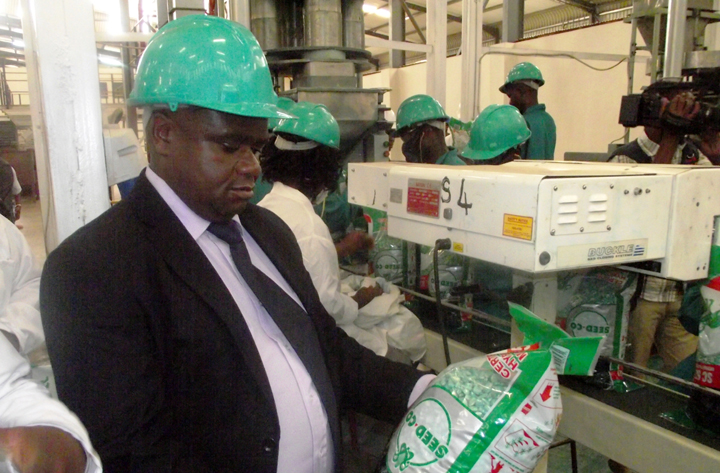SeedCo volumes remain flat
The country’s largest seed processor, Seed Co International Limited (SeedCo) revenue for the full year to March 31, 2022 was flat at US$88,5 million, albeit on reduced sales volume, helped mainly by the strengthening of the Zambian Kwacha against the USD and business growth in Mozambique.
Seed Co is one of the leading certified seed companies authorised to market seed varieties developed by itself, government and other associated seed breeders in its markets.
From years of intensive investment in Research and Development (R&D), the Company is involved in the breeding, multiplication and distribution of mainly hybrid seed varieties.
SCIL listed on the Botswana Stock Exchange in 2018 and in 2020 became the first to list on the new United States dollar-denominated Victoria Falls Stock Exchange (VFEX).
Group Chief executive, Morgan Nzwere, in an analyst presentation said volume uptake was impacted by bad weather and reduced government subsidy support in Malawi.
“Product availability was generally good this year though readiness to market was delayed by late dry down due to the excessive wet prior year (FY21) season,” he said.
He added that stockouts were experienced in Nigeria and Kenya due to bad production prior period seasons such as flooding in Nigeria and drought in Kenya.
“2022/23 maize season production now at intake stage is expected to be 5 percent higher
than prior year’s 32,000mt but might be lower due to erratic rains which affected growth
and pollination,” said Nzwere.
The group has subsidiaries, associate and joint ventures located in Botswana, Democratic
Republic of Congo (DRC), Ghana, Kenya, Malawi, Mozambique, Nigeria, Rwanda, South
Africa, Tanzania, and Zambia. Operations in Angola, Ethiopia and parts of West Africa are
at different stages of development.
According to Nzwere, total sales volumes were 11 percent below prior year with the main
crop, maize, down 19 percent due to the 50 percent cut of the government subsidy
contribution in Malawi that also saw Seed Co Malawi volumes declining by 32 percent.
He said late rains in Zambia and impact of price increases dropped volume by 14 percent
while product unavailability dropped 34 percent in Nigeria as drought and product
shortages weighed down volume by 12 percent in Kenya.
Nzwere also highlighted that late rains and pricing competition reduced volumes in
Botswana and DRC by 13 percent and 67 percent respectively.
“However, volume performance was stable in Tanzania as the business consolidated
while the more than doubling of volume in Mozambique helped to partly offset volume
loss in most markets,” he said.
During the period under review, the company commissioned a 4,000 sqm seed warehouse
and 6 driers at Mkushi Farms and plant capacity upgrades in Tanzania are planned this
FY22/23 financial year.
“The pilot phase to introduce cob harvesting and seed drying technology across the
Group is now complete as the pilot plant commissioned in Zimbabwe is now
operational,” Nzwere said.
According to the presentation, Nigeria volume setback was due to product unavailability
resulting in lower volume at 1,147mt compared to 1,514mt in FY21, resulting in lower
profitabilityat$0.2 million compared to $0.4 million.
“Seed imports and local production planned this year to ensure product availability in
the upcoming season and the new processing plant recently commissioned now
contributing to efficiencies,” said Nzwere.
He said in Ethiopia security issues slowed down business establishment activities while
in Ghana and Francophone West Africa there was a promising start from maiden
operating year breakeven in FY21 to $0.2 million to profitability in FY22.
“Demand creation activities are being intensified across the region though some
countries are inaccessible due to security issues such as Burkina Faso, Mali, Cameroon.
In Mozambique, volume jumped to 3,900mt in FY22 from 1,800 mt. Nzwere said that
mainly soybean, cowpea & beans continue to show promise with increasing demand for
legumes, maize and vegetable seeds.
In terms of the vegetable seed Joint Venture (JV), the regional JV grew revenue by 13
percent to US$5.9 million but the bottom line remained marginally in the negative
impacted by pressure on margins on largely imported seeds and general inflation.
Nzwere said while Zambia’s $35 million turnover was in line with prior year, its volume
was lower than prior year.
He said despite volume loss, Zambia’s turnover was helped by selling price adjustments
and translation gains after the kwacha appreciated.
“One percent turnover increase to $35 million is due to a 23 percent average price
increase and the gains of translating kwacha revenue to USD using a 7 percent stronger
USD/kwacha average rate of 18.744 compared to 20.096 prior year,” said Nzwere.
During the period under review, the Group released new varieties SC449, SC547, SC553,
SC555 and SC735 in Zambia as well as SC555, SC559, SC665 and SC729 in Malawi.
The group also released SC735 in Nigeria and licensed an early maturing yellow maize
variety in Nigeria, SC526, a top cross hybrid aimed at improving ease of production.
John Matorofa, the Group Finance Director on his part said the group’s reduced
profitability this year resulted in a profit after tax of US$7.1 million lower than $11.1
million due to gross margin shrinkage mainly in Zambia as the kwacha appreciated
reduced economies of scale as volume declined 11 percent with significant declines in
Malawi, Zambia & Nigeria.
“Despite notable volume reduction, revenue was flat, anchored by phenomenal revenue
growth in Mozambique albeit from lower margin legumes, local currency price
adjustments and currency translation gains mainly out of Zambia,” he said.
Matorofa said that despite 19 percent volume drop and 12 percent turnover reduction,
maize seed continues to dominate both revenue and volume contribution in all markets
except Mozambique, halved government subsidy contribution in Malawi and erratic rains
in Zambia and Kenya as well as product unavailability in Nigeria.
He said wheat seed sales increased compared to last year while legumes increased from
tender sales in Mozambique and open market sales in Zambia.-eBusiness Weekly











